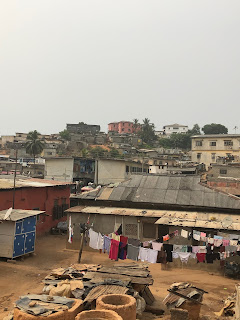More Hospital Medicine
Hello, friends! I am almost done with my third week here in Cape Coast, Ghana, and it has been a very eye-opening experience. Last week, I shared a little about the differences in medical care here in Ghana versus the US. I wanted to share a little more about the hospital system here in Ghana to provide some additional perspective. The wards are set up in each building with male and female medical and surgical wards being separate. These wards consist of three to four large rooms with 6-10 beds in each room. There are 2-3 isolation rooms in each ward for those patients that have some kind of infectious disease process. There are private rooms available for an additional cost, but usually patients who want these go to the private hospital rather than the public government-funded hospitals. One of the buildings holds the ICU and dialysis unit. The ICU has five beds. Patients who require an ICU stay usually have to wait due to limited availability, but they are also required to pay up-front costs for an ICU stay. I shared last week about a patient with a large hemorrhagic stroke who truly needed ICU care, but due to financial constraints and ICU availability the patient was managed on the high-dependency unit in the regular medical ward. Only the teaching hospitals and private hospitals have ICU beds available. The private hospitals are generally too expensive for most patients to afford, and there are only five teaching hospitals in the entire country. This leaves very limited resources to those who need it. In comparison, in Birmingham, AL there are at least five hospitals with 20-30 ICU beds or more in each hospital...and ANY patient does not have to pay for the ICU stay up-front.
In regards to insurance coverage here in Ghana, despite the low cost of $5-6/year it does not cover hardly anything. It covers basic labs which include a full blood count, liver function test, renal function test, HIV, and hepatitis panels. If admitted, a chest x-ray would also be covered. Things that are not covered under medical insurance here that has to be paid for up-front prior to the service being rendered: x-ray of anything besides chest, electrolyte panels, EKG, any CT scan, many medications, and glucose test strips. There is a patient on the ward currently being treated for Hyperosmolar Hyperglycemic State (HHS) with seizures which occurs when a diabetic has extremely high sugars with other physiologic manifestations. This patient gets routine blood sugars throughout the day, but yesterday she ran out of glucose test strips. She is unable to pay for more currently, so we are really unable to treat her properly because we do not know what her blood sugars are. I have seen story after story each day on the ward where the typical things that can get a patient well simply can not be done because the patient can't afford it. It is very heartbreaking to say the least.
As someone who has spent time during medical school advocating for better healthcare in the US, I realize the problems our system has in the US. The inequality here in Ghana and in many third world countries is devastating. I hope to continue learning and advocating not just for equality in healthcare back home, but around the world.
In regards to insurance coverage here in Ghana, despite the low cost of $5-6/year it does not cover hardly anything. It covers basic labs which include a full blood count, liver function test, renal function test, HIV, and hepatitis panels. If admitted, a chest x-ray would also be covered. Things that are not covered under medical insurance here that has to be paid for up-front prior to the service being rendered: x-ray of anything besides chest, electrolyte panels, EKG, any CT scan, many medications, and glucose test strips. There is a patient on the ward currently being treated for Hyperosmolar Hyperglycemic State (HHS) with seizures which occurs when a diabetic has extremely high sugars with other physiologic manifestations. This patient gets routine blood sugars throughout the day, but yesterday she ran out of glucose test strips. She is unable to pay for more currently, so we are really unable to treat her properly because we do not know what her blood sugars are. I have seen story after story each day on the ward where the typical things that can get a patient well simply can not be done because the patient can't afford it. It is very heartbreaking to say the least.
As someone who has spent time during medical school advocating for better healthcare in the US, I realize the problems our system has in the US. The inequality here in Ghana and in many third world countries is devastating. I hope to continue learning and advocating not just for equality in healthcare back home, but around the world.

Comments
Post a Comment